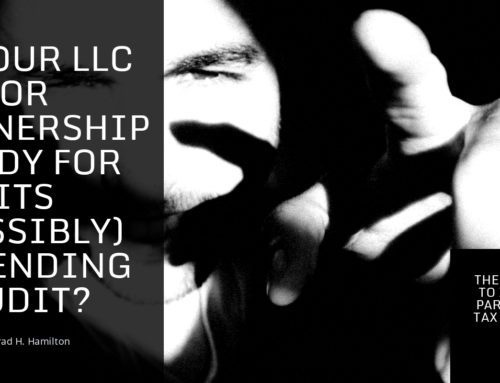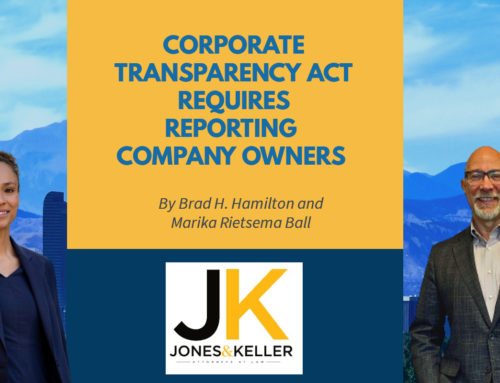By Brad H. Hamilton, August 27, 2020
On August 26, 2020 the Securities and Exchange Commission announced its long-awaited update to the definition of an ‘accredited investor,’ and the resulting changes are underwhelming for issuers, entrepreneurs, and start-ups. “Accredited investors” now include
- individuals with SEC Series 7, 65 and 82 licenses (licensed securities brokers and dealers and their agents),
- “knowledgeable employees” of a private fund,
- “spousal equivalent” for determining income or wealth of a couple,
- Native American tribes and tribal entities (who previously had to form and fund a state chartered entity to qualify),
- SEC and state registered investment advisers, exempt reporting advisers, and rural business investment companies, and
- foreign entities and family offices with greater than $5 million in investment.
The SEC also confirmed that a limited liability company with $5 million in assets is an accredited investor (although this merely confirmed an existing practice).
The amendment becomes effective on October 26, 2020.
The base definition of an accredited investor is a person who earns at least $200,000 a year or $300,000 a year jointly with spouse (now including spousal equivalent) or has at least $1 million in net worth excluding equity value of their primary residence. The definition also includes entities and funds that meet minimum asset or value thresholds. Those minimums were established in 1982 but have not be adjusted for inflation, which has the benefit of increasing the pool of accredited investors over time.
The definition of accredited investor is exceedingly important to entrepreneurs, start-ups, early growth companies, and other businesses that need investor money, because if an issuer includes only accredited investors in its private placement offering, it can take advantage of the SEC’s Regulation D offering safe harbors. The Reg. D private placement exemption is important because it preempts state securities registration requirements in certain instances, reduces the burden of comprehensive disclosure (although robust and accurate disclosure remains the only way to insulate the issuer and its promoters from liability for securities fraud arising from omissions to disclose a material fact).
Private placements are usually the only viable method for an early stage business to raise investor money, since access to the public securities markets for small startups has been regulated out of existence over the last two decades. Up until the 2000’s a new venture could file a registration statement with the SEC, conduct an initial private placement, and raise necessary money for its business at a reasonable cost. Of course, fraudulent conduct abounded, and after some large frauds such as Enron, Bre-X, Phar-Mor, and a plethora of penny stock scams, the threshold requirements and costs to conduct an initial public offering were increased by both the SEC (as a result of the Sarbanes-Oxley Act) and the New York and NASDAQ stock exchanges to a level that makes small offerings financially nonviable.
In 1999 (during the Telecom bubble) there were 486 IPO’s. In 2019 there were 159.
With access to the public markets denied to startups and smaller businesses, private equity, venture capital, and similar investment funds have grown substantially to fill the void, as have investment opportunities for individually wealthy ‘angel investors.’ Each offering to a private equity fund or syndicate of angel investors is conducted as a private placement, and that is where the definition of accredited investor applies. In 2019 companies raised $2.7 trillion in private placements, and less than half of that ($1.2 trillion) in registered public offerings, but only from initial public offerings.
When start-ups offer investment only to accredited investors, less wealthy and less sophisticated persons are prohibited from the opportunity to make money through private investments in order to protect them from losing money in private investments. In fact, even this modest expansion of the definition of accredited investor was approved by only three of the five SEC commissioners, and the dissenting commissioners, Allison Herren Lee and Caroline Crenshaw, published a joint statement decrying the SEC’s action, stating among other things that:
“In fact, private offerings are not just less transparent, but also illiquid, and prone to fraud. In response to evidence of fraud in the private market, the adopting release argues that “commenters did not provide information that would indicate that any such incidents of fraud in the private markets are driven or affected by the levels at which the accredited investor definition is set.” This quite plainly misconstrues the point: it’s not that the accredited investor definition somehow causes fraud, it’s that it allows more investors to be exposed to the risks of fraud.”
It is indisputable that increasing securities regulation has closed the public market place to smaller startups, entrepreneurs, and early stage companies, and driven them to seek investment from wealthy venture capital and private equity funds, angel investors, and sophisticated investment syndicates. Smaller private placements to individual accredited investors is the closest thing left to an IPO for startup and smaller businesses. Over the next 12-months, assuming the COVID-19 pandemic is under reasonable control and the resulting economic recession is not long, we anticipate (1) many businesses that struggled but survived will need new capital infusions from investors, and (2) startup business plans that have been put on hold for better times will start to launch. The SEC has taken a small step to increase the available private placement investor pool, but done very little to increase market access to small investors, in the interest of protecting them from fraud.




